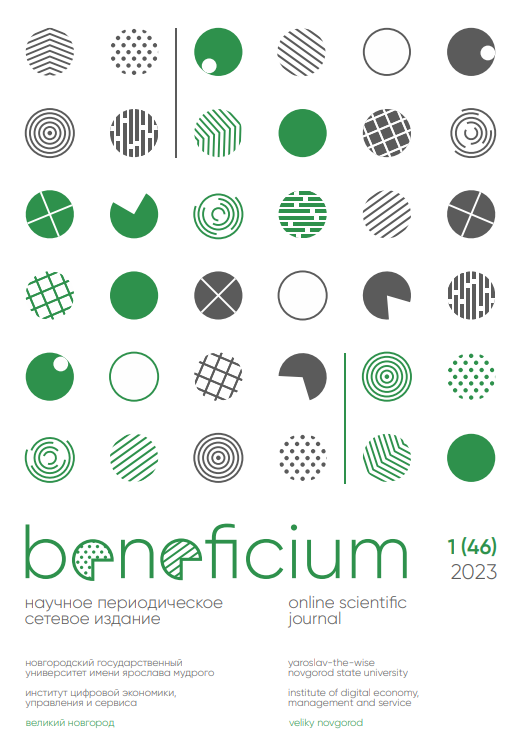TO THE ANALYSIS OF THE SCIENTIFIC CATEGORY “MANAGEMENT SYSTEM”
Abstract
Understanding the essence and features of management allows us to correctly build a system of effective implementation of its functions at all levels of the organizational hierarchy. The purpose of the study was to determine the essence of the concept of "management system", the features its construction. To achieve this goal, the main categories of management have been considered, which are its object, subject, functions and approaches. The elements of the management system and their mutual influence are defined. It was revealed how the interaction of subjects and objects of management is carried out. It is shown that the system of management of organization includes subsystems of management of its functioning and development; as they are aimed at managing different objects, respectively, the problems to be solved and the methods of solving them are different. Different system approaches in management, including "hard" and "soft" management are considered; their peculiarities are revealed. Factors of effective management of organization that consist in providing qualitative feedback, functionally filled and organizationally well-coordinated management business-processes, adequate management decisions, forecasting of crisis situations in the object of management and searching of new possibilities of development of object of management are distinguished.
Keywords: management, management object, management structure, management subject, organizational structure
References
Meskon M., Albert M., Hedouri F. Osnovy menedzhmenta [Fundamentals of management]. Moscow: Williams, 2017. 672 p. (In Russ.).
Selezneva E.V. Psihologiya upravleniya: uchebnik i praktikum dlya vuzov [Management Psychology: textbook and workshop for universities]. Moscow: Yurayt, 2022. 373 p. (In Russ.).
Mitroshenkov O.A. Filosofiya upravleniya: uchebnik dlya bakalavriata i magistratury [Philosophy of Management: Textbook for undergraduate and graduate studies]. Moscow: Yurayt, 2021. 248 p. (In Russ.).
Korgova M.A. Menedzhment. Upravlenie organizaciej: uchebnoe posobie dlya srednego professional'nogo obrazovaniya [Management. Organization management: a textbook for secondary vocational education]. Moscow: Yurayt, 2020. 197 p. (In Russ.).
Astakhova N.I., Moskvitin G.I. Menedzhment: uchebnik dlya prikladnogo bakalavriata [Management: Textbook for Applied Bachelor's degree]. Moscow: Yurayt, 2022. 422 p. (In Russ.).
Salogub A.M., Galan I.K. Management format in fast-growing foreign IT-companies // Medicine. Sociology. Philosophy. Applied research. 2020. Vol. 3. Pp. 98-103. (In Russ.).
Rodin D.V. Hard and Soft human resource management in organization // Vestnik of Volzhsky University after V.N. Tatischev. 2015. Vol. 3(34). Pp. 231-239. (In Russ.).
Samoukina N. Zhestkij ili myagkij menedzhment? Ekspluataciya ili sotrudnichestvo? [Hard or soft management? Exploitation or cooperation?]. (In Russ.). URL: https://bt-seminar.ru/zhestkiy-ili-myagkiy-management-ekspluatatsiya-ili-sotrudnichestvo (accessed on 26.11.2022).
Kennedy D. Zhestkij menedzhment. Zastav'te lyudej rabotat' na rezul'tat [Tough management. Make people work for results]. Moscow: Alpina Publisher, 2017. 296 p. (In Russ.).
Davletov A.R. Employee loyalty as a factor influencing the efficiency of enterprises // Science without Borders. 2020. Vol. 9(49). Pp. 28-33. (In Russ.).
About the Authors
Sergey A. Bannikov – Cand. Sci. (Economics), Docent; Associate Professor, Financial University under the Government of the Russian Federation, Moscow, Russia.E-mail: SABannikov@fa.ru. SPIN РИНЦ 9726-6857. ORCID 0000-0002-6418-0034. ResearcherID 886947. Scopus Author ID 57205360791
Madina G. Toshboltaeva – Student in the Master’s programme, Financial University under the Government of the Russian Federation, Moscow, Russia. E-mail: madina.toshboltaeva@gmail.com. ORCID 0009-0002-8072-596X. ResearcherID HQZ-8516-2023
For citation: Bannikov S.A., Toshboltaeva M.G. To the Analysis of the Scientific Category “Management System” // BENEFICIUM. 2023. Vol. 1(46). Pp. 69-73. DOI: 10.34680/BENEFICIUM.2023.1(46).69-73









